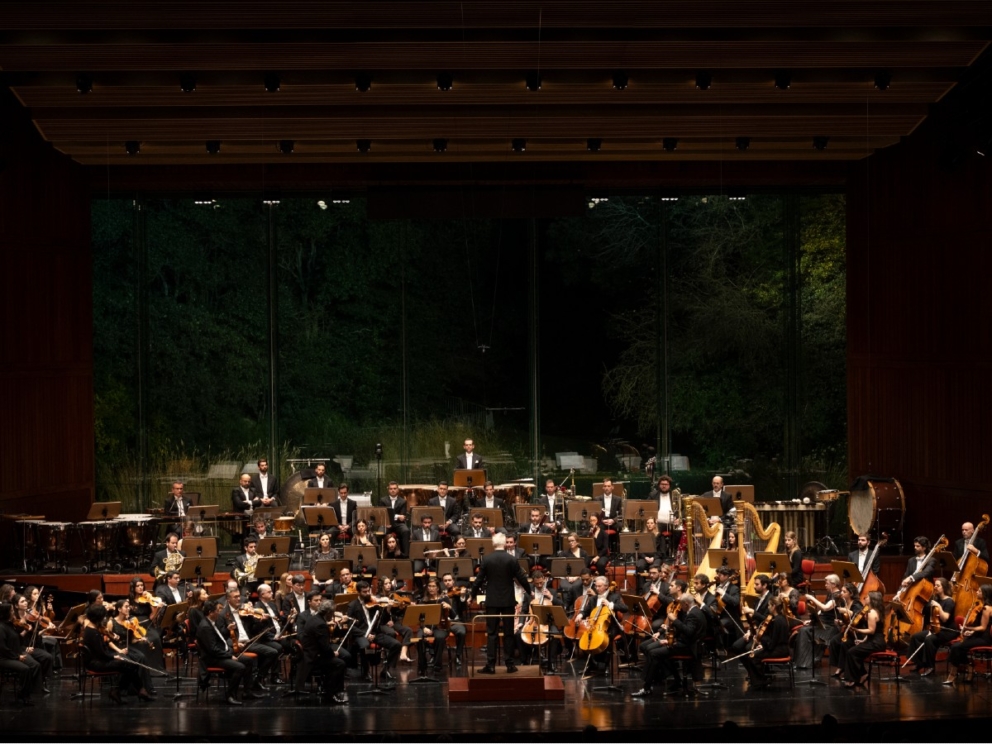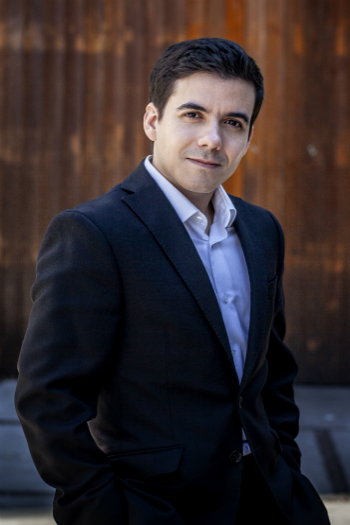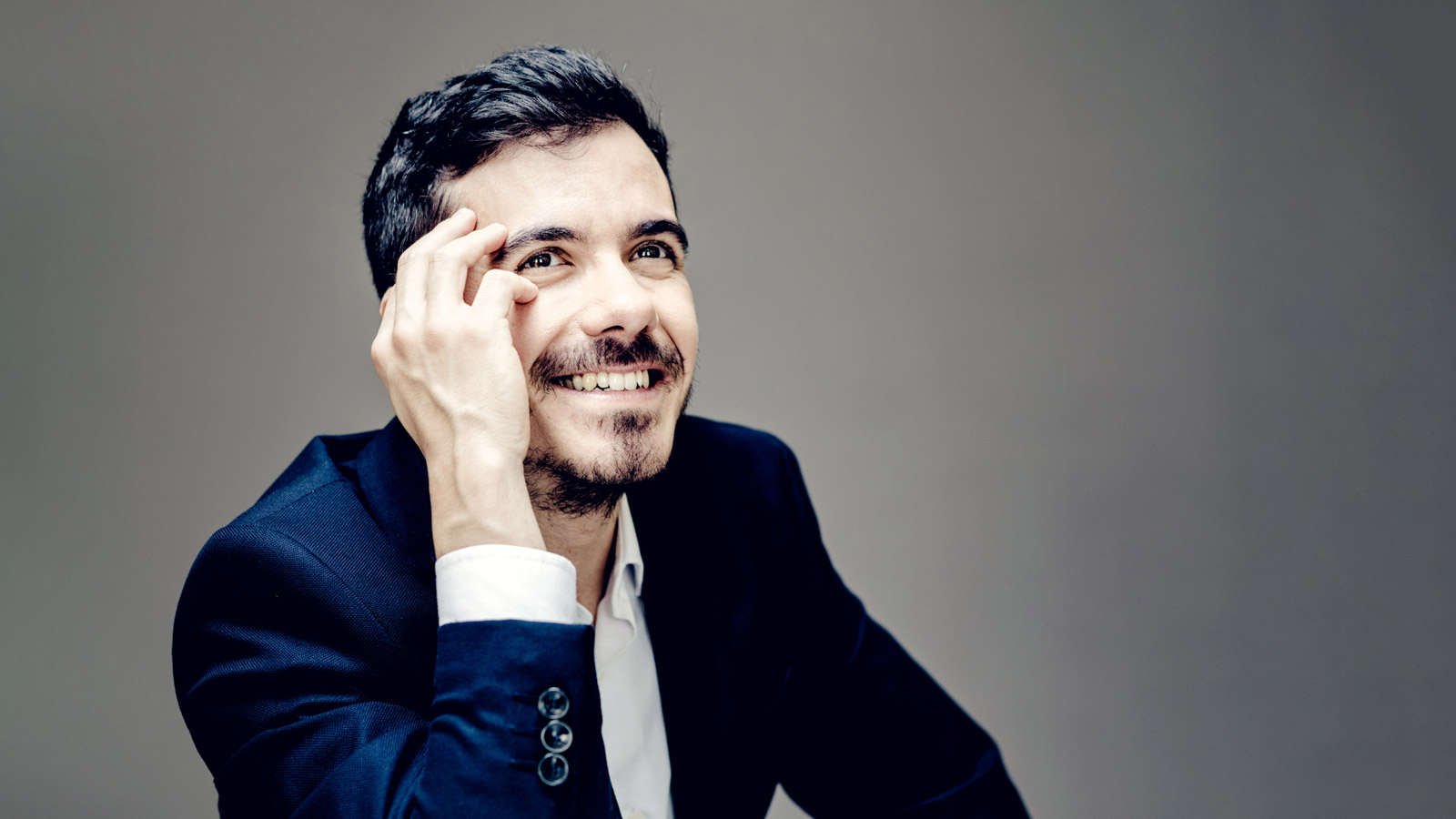Beethoven's Eroica
Gulbenkian Orchestra
Event Slider
Date
- / Cancelled / Sold out
Location
Grand Auditorium Calouste Gulbenkian FoundationThis concert will be broadcast live here on 26 April at 19:00.
Pricing
25% – Under 30
10% – Over 65
Cartão Gulbenkian:
50% – Under 30
15% – Over 65
- Conductor
-

Gulbenkian Orchestra
In 1962, the Calouste Gulbenkian Foundation decided to establish a permanent orchestral ensemble. Originally with only twelve musicians (strings and continuo) it was named “Orquestra de Câmara Gulbenkian”. This collective was successively enlarged and today the “Orquestra Gulbenkian” (the name it has adopted since 1971) has a permanent body of sixty instrumentalists, a number that can be expanded depending on the repertoire.
This structure allows the Gulbenkian Orchestra to interpret works from the Baroque and Classical periods, a significant part of 19th century orchestral literature and much of the music of the 20th century, including works belonging to the current repertoire of the traditional symphonic orchestras. In each season, the orchestra performs on a regular series of concerts at the Gulbenkian Grand Auditorium in Lisbon, where it has had the opportunity of working together with some of leading names of the world of music (conductors and soloists). It has also performed on numerous locations all over Portugal, in an effort to decentralize music and culture.
The orchestra has been constantly expanding its activities in the international level, performing in Europe, Asia Africa, and the Americas. In the recording field, Orquestra Gulbenkian is associated to labels as Philips, Deutsche Grammophon, Hyperion, Teldec, Erato, Adès, Nimbus, Lyrinx, Naïve and Pentatone, among others, and this activity was recognized with several international prizes.
-

Nuno Coelho
Guest Conductor
The 2022/23 season sees Nuno Coelho commence his Chief Conductor and Artistic Directorship of the Orquesta Sinfónica del Principado de Asturias. He also begins his fifth year as Guest Conductor of the Gulbenkian Orchestra with a production of José Saramago’s reimagining of Mozart’s Don Giovanni to mark the writer’s centenary. Highlights elsewhere include debuts with the Royal Concertgebouw Orchestra, Tampere Philharmonic and Sinfonieorchester St Gallen; returns to Antwerp Symphony and Orquesta Sinfónica de Tenerife; and a tour with the Joven Orquesta Nacional de España.
Last season saw Nuno debut with the Helsinki Philharmonic, Dresden Philharmonie, Staatsorchester Hannover, Orchestre Philharmonique du Luxembourg, Gavle Symphony, Malmö Symphony, Residentie Orkest, Orchestre philharmonique de Strasbourg and Orchestre National de Lille; and continue his relationships with the Orquesta Sinfonica de Galicia and Orquestra Simfónica de Barcelona. In March 2022 he conducted a semi-staged Così fan tutte at the Gulbenkian, adding to theatre credits which include productions of La traviata, Cavalleria rusticana, Rusalka, Das Tagebuch der Anne Frank and Seven Deadly Sins.
Nuno won First Prize at the 2017 Cadaqués International Conducting Competition and has since gone on to conduct the Royal Liverpool Philharmonic, BBC Philharmonic, Symphoniker Hamburg, Orquesta Sinfónica de Castilla y León, Noord Nederlands Orkest and Orchestra Teatro Regio Torino. He was a Los Angeles Philharmonic Dudamel Fellow between 2018-19 and stepped in for Bernard Haitink that same season to make his debut with the Symphonieorchester des Bayerischen Rundfunks.
Born in Porto, Nuno studied conducting at the Zürich University of the Arts with Johannes Schlaefli and won the Neeme Järvi Prize at the Gstaad Menuhin Festival. In 2015 he was admitted into the German Music Council’s Dirigentenforum and for the following two years he was both a Tanglewood Conducting Fellow and Assistant Conductor of the Netherlands Philharmonic. Literature and tennis occupy his time off-podium.
Nuno da Rocha
Restart
Unsuk Chin
Subito con forza
Ludwig van Beethoven
Symphony No. 3, in E-flat major, op. 55, Eroica
TRANSMISSION
The Gulbenkian Orchestra is joining the commemorations of the 50th anniversary of 25th April, the founding day of Portuguese democracy, in a concert composed of a work by the Portuguese composer Nuno da Rocha and Beethoven’s famous Heroic Symphony. Half a century after the 25th April 1974, the “Initial day whole and clear / Where we emerge from the night and the silence”, described in the words of Sophia de Mello Breyner, it is also through music – which played a determining role in the Carnation Revolution – that we celebrate life in freedom.
Sponsor Gulbenkian Music
The Calouste Gulbenkian Foundation reserves the right to collect and keep records of images, sounds and voice for the diffusion and preservation of the memory of its cultural and artistic activity. For further information, please contact us through the Information Request form.
